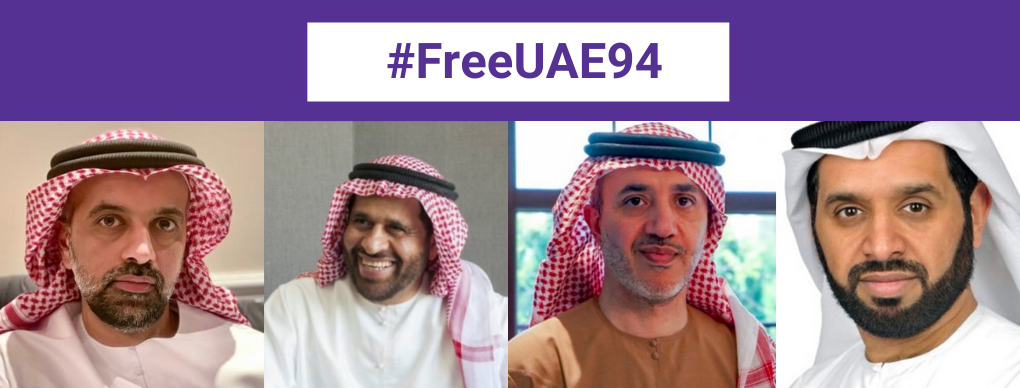September 17, 2021

We, the undersigned organisations, strongly condemn the inclusion of four members of the UAE 94, as part of the UAE’s national terrorism list, under the UAE Cabinet’s ministerial resolution No. 83 of 2021 on September 12. This latest move by the UAE is but a mere continuation of the authorities’ repressive tactics against Emirati individuals exercising their right to freedom of expression in a manner that is deemed to be critical of the authorities.
The four Emirati individuals added to the terrorism list – Hamad Al Shamsi, Ahmed Al Nuaimi, Mohammed Al Zaabi, and Saeed Al Tenaiji – are not terrorists, but political activists and human rights defenders who are being targeted as a result of the legitimate exercise of their right to free speech. All four individuals belong to the UAE 94, a group of Emirati scholars, activists, lawyers, doctors and human rights defenders who were put on mass trial in 2013, after signing a petition calling for greater democratic reforms within the Emirates, including the establishment of democratic elections for all members of the Federal National Council. The four men were also members of the Reform and Social Guidance Association (Al Islah), an association that had been operating in the UAE since 1974 but was banned by the authorities in March 2014.
Hamad Al Shamsi is the Executive Director of the Emirates Detainees Advocacy Center, a non-profit organisation that seeks to shed light on the plight of prisoners of conscience detained in Emirati prisons and advocates on their behalf. Ahmed Al Nuaimi is an Emirati political dissident and brother of Khaled Al Shaiba Al Nuaimi, another member of the UAE 94. Mohammed Al Zaabi is a former UAE public prosecutor, while Saeed Al Tenaiji is a teacher and activist, and a former director of Al Islah. Given that they were all outside of the UAE at the time of the mass arrests and subsequent trials, all four aforementioned individuals were tried and sentenced, in absentia, to 15 years in prison.
The listing of individuals and organisations on the UAE’s national terrorism list is based on Federal Law No. 7 of 2014, which maintains in its article 63 that the “UAE Cabinet may, based on the proposal of the Minister of Presidential Affairs, issue a decision on the creation of a list(s) of terrorist organisations or persons that pose threat to the State.” The law, however, does not outline the criteria that is to be used in order to determine whether an individual or an organisation should be added to the terrorism list, but instead maintains that the “rules of inclusion, write-off and re-inclusion as well as the legal effects resulting from the aforementioned” will be specified by the Cabinet’s Decision on the creation of a list(s). Commenting on Law No. 7 of 2014, several UN mandate holders warned that the executive branch “could approve the proscription of any entity as a terrorist entity without being required to legally demonstrate that there is objective reason to believe that such a designation is justified, despite the far-reaching implications that such a designation could have.” UN mandate holders additionally warned that the law “could contribute to an arbitrary and unreasonable use of these powers,” potentially leading to the “criminalisation or persecution of organisations or individuals that are not ‘genuinely’ terrorist in nature, which would be contrary to Security Council resolution 1566 (2004) and the model definition referred to previously, as well as in contravention of international standards on freedom of expression.”
In 2013, the UN Working Group on Arbitrary Detention (WGAD) found, in its Opinion No. 60/2013, that the detention of 61 individuals, all of whom are members of the UAE 94, was arbitrary. In its Opinion, the WGAD called on the UAE to release the 61 individuals and provide them with adequate reparations. Earlier this June, the UN Special Rapporteur on the Situation of Human Rights Defenders, Mary Lawlor, found that the members of the UAE 94 “should have never been detained in the first place for legitimately exercising the freedoms that all people are entitled to.”
We regret that instead of complying with the UN recommendations and upholding the provisions of the Universal Declaration of Human Rights, the UAE has not only maintained the arbitrary detention of those 61 individuals, several of whom remain detained despite having completed their sentences, but has also gone on to target members of the UAE 94 living outside of the Emirates, in addition to their families. As part of their crackdown on the UAE 94, the authorities have arrested, placed travel bans, and revoked the citizenship of family members of the UAE 94, including those of Ahmad Al Nuaimi and Mohammed Al Zaabi. The UAE Cabinet’s ministerial decision to include members of the UAE 94 on the national terrorism list is but another tactic used by the authorities to repress all forms of political opposition within the Emirates and beyond. We fear that this decision will have chilling effects on the work of Emirati activists, human rights defenders, dissidents and political opponents and will only further perpetuate a climate of silence and repression within the Emirates.
We regret that beyond the theatrics of establishing a Ministry of Tolerance, the UAE authorities continue to exhibit no tolerance for dissenting and opposing voices in the Emirates. We call on the UAE to immediately and unconditionally remove the names of Hamad Al Shamsi, Ahmed Al Nuaimi, Mohammed Al Zaabi and Saeed Al Tenaiji from the national terrorism list and to immediately and unconditionally release all of those who have been unjustly and arbitrarily detained as part of the UAE 94 trial.
List of signatory organisations:
ACAT-France, ALQST for Human Rights, Americans for Democracy and Human Rights in Bahrain (ADHRB), Association of Victims of Torture in UAE (AVT-UAE), CIVICUS, European Centre for Democracy and Human Rights (ECDHR), Emirates Detainees Advocacy Center (EDAC), Gulf Centre for Human Rights (GCHR), International Campaign for Freedom in the UAE (ICFUAE), MENA Rights Group.






